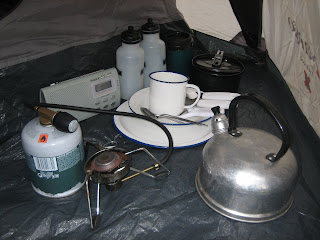



Although I love travelling on foot, long distance walking, short distance walking, linear walks, circular walks, discovering new places (the countryside and wilderness for sure, but sometimes towns and cities too), camping and experiencing the great outdoors whatever the weather, although I love all of these things I'm not really a backpacker-wildcamper. Or not yet, that is. Lately I've been following with great interest many of the lightweight backpacking and wildcamping blogs and websites such as Backpacking In Britain. For years I've been reading other people's personal accounts such as John Hillaby's Journey Through Britain or more practical guides such as Chris Townsend's Backpacker's Handbook. And dreaming.
The self-sufficiency of backpacking-wildcamping is, I suppose, the hiker's ultimate freedom. You're not tied down to the strictures of a B & B, a hostel or an official campsite. You can make camp for the night in a beautiful and remote location of your own choosing (within reason). You can come and go as you please. You have the immense satisfaction of knowing that everything you need you're carrying with you. However a successful trip like this (compared with car camping) does require some experience and a certain amount of forward planning, a degree of imagination and a smidgen of practicality, an ability to improvise and some careful research into the right lightweight equipment to buy.
You could say wildcamping is more purist - the ultimate in wilderness connection. If car camping is the regular army, then wildcamping is the SAS. With wildcamping you can be truly eco-friendly by leaving the car behind and reducing your carbon footprint. I look forward to doing it myself before very much longer - when I can afford the initial outlay on the right gear. But car camping does have some plus points. Weight is not an issue so you can bring what food you want - and books, a radio, lots of spare clothing etc. And on campsites it is nice to have hot water, showers, toilets, a place to wash socks and cooking pots etc. But you have to be very careful about which campsites to choose and when to go there. I've learnt from experience to avoid weekends, and school and public holiday times.
I like small, obscure, simple sites. Often these are attached to farms. Their facilities are often basic but that's fine by me. Of course they're cheaper (I don't like paying more than £5) and, generally speaking, quieter than the bigger, more commercial sites. Though there are always exceptions. I've been family camping in Brittany on a big, popular site where you couldn't hear a pin drop after 11 pm. Yet on the other hand I've been on small farm sites in Shropshire and the Lake District where noise (I won't go into detail!) from a few isolated tents lasted most of the night... On another occasion I went to the Literary Festival at Hay-on-Wye and camped on a small pub campsite. I was kept awake the whole night long by mind-numbing high-volume trance music pounding out from a rave taking place miles away. So it can all be a bit of a gamble.
The photos show my tent in peaceful (except for the peacocks - see yesterday's post!) Cwm Bychan - views of it, in it and from it.



 The
The